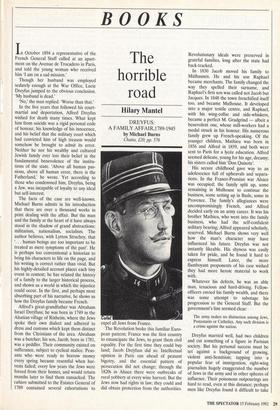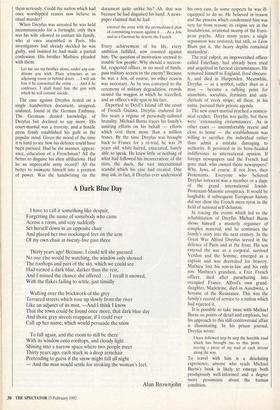BOOKS I n October 1894 a representative of the French General
Staff called at an apart- ment on the Avenue de Trocadero in Paris, and told the young woman who received him 'I am on a sad mission.'
Though her husband was employed sedately enough at the War Office, Lucie Dreyfus jumped to the obvious conclusion. `My husband is dead.'
`No,' the man replied. 'Worse than that.'
In the five years that followed his court- martial and deportation, Alfred Dreyfus wished for death many times. What kept him from suicide was a rigid personal code of honour, his knowledge of his innocence, and his belief that the military court which had convicted him of high treason would somehow be brought to admit its error. Neither he nor his wealthy and cultured Jewish family ever lost their belief in the fundamental benevolence of the institu- tions of the state. 'Above all human pas- sions, above all human error, there is the Fatherland,' he wrote. Yet according to those who condemned him, Dreyfus, being a Jew, was incapable of loyalty to any ideal but self-interest.
The facts of the case are well-known. Michael Burns admits in his introduction that there are over a thousand works in print dealing with the affair. But the man and the family at the heart of it have always stood in the shadow of grand abstractions: militarism, nationalism, socialism. The author believes, with Lytton Strachey, that `. . . human beings are too important to be treated as mere symptoms of the past'. He is perhaps too conventional a historian to bring his characters to life on the page, and his writing is correct rather than vivid. But his highly-detailed account places each tiny event in context; he has related the history of a family to the larger historical process, and shown us a world in which the injustice could occur. In the first, and perhaps most absorbing part of his narrative, he shows us how the Dreyfus family became French.
Alfred's great-grandfather was Abraham Israel Dreyfuss; he was born in 1749 in the Alsatian village of Rixheim, where the Jews spoke their own dialect and adhered to dress and customs which kept them distinct from the Christians of the area. Abraham was a butcher; his son, Jacob, born in 1781, was a peddler. Their community existed on sufferance, subject to cyclical malice. Peas- ants who were ready to borrow money every spring became resentful when har- vests failed; every few years the Jews were forced from their homes, and would return months later to find them ransacked. The
cahiers submitted to the Estates General of 1789 contained several exhortations to
The horrible road
Hilary Mantel
DREYFUS: A FAMILY AFFAIR,1789-1945 by Michael Burns Chatto, £20, pp. 576
expel all Jews from France.
The Revolution broke this familiar Euro- pean pattern; France was the first country to emancipate the Jews, to grant them civil equality. For the first time they could buy land; Jacob Dreyfuss did so. Intellectual opinion in Paris ran ahead of peasant bigotry, and the essential pattern of persecution did not change; through the 1820s in Alsace there were outbreaks of rural yobbery at every wine harvest. But the Jews now had rights in law; they could and did obtain protection from the authorities. Revolutionary ideals were preserved in grateful families, long after the state had back-tracked.
In 1830 Jacob moved his family to Millhausen. He and his son Raphael became merchants. The family changed the way they spelled their surname, and Raphael's first son was called not Jacob but Jacques. In 1848 the town frenchified itself too, and became Mulhouse. It developed into a major textile centre, and Raphael, with his wing-collar and side-whiskers, became a perfect M. Gradgrind — albeit a benevolent one, whose mill-workers had a medal struck in his honour. His numerous family grew up French-speaking. Of the younger children, Mathieu was born in 1856 and Alfred in 1859, and both were sent to Paris for a lycee education. Alfred seemed delicate, young for his age, dreamy; his sisters called him 'Don Quixote'.
His secure childhood gave way to an adolescence full of upheavals and separa- tions. In the Franco-Prussian war Alsace was occupied; the family split up, some remaining in Mulhouse to continue the business, some setting up in Basle, some in Provence. The family's allegiances were uncompromisingly French, and Alfred decided early on an army career. It was his brother Mathieu, who went into the family business, who had the self-confident military bearing; Alfred appeared scholarly, reserved. Michael Burns shows very well how the man's character may have influenced his future. Dreyfus was not instantly likeable. His shyness was easily taken for pride, and he found it hard to express himself. Later, the more flamboyant proponents of his case wished they had more heroic material to work with.
Whatever his defects, he was an able man, tenacious and hard-driving. Fellow- officers envied his family wealth, and there was some attempt to sabotage his progression to the General Staff. But the government's line seemed clear:
The army makes no distinction among Jews, Protestants or Catholics. Any such division is a crime against the nation.
Dreyfus married well, had two children and cut something of a figure in Parisian society. But his personal success must be set against a background of growing, violent anti-Semitism; tapping into a popular fear of immigration, right-wing journalists hugely exaggerated the number of Jews•in the army and in other spheres of influence. Their poisonous outpourings are hard to read, even at this distance; perhaps men like Dreyfus found it difficult to take them seriously. Could the nation which had once worshipped reason now believe in ritual murder?
When Dreyfus was arrested he was held incommunicado for a fortnight; only then was his wife allowed to contact his family, who at once assembled in Paris. His investigators had already decided he was guilty, and insisted he had made a partial confession. His brother Mathieu pleaded with them:
Let me see my brother alone, under any con- ditions you wish. Place witnesses in an adjoining room or behind doors... I will ask him if he committed the crime ... And if he confesses, I shall hand him the gun with which he will commit suicide.
The case against Dreyfus rested on a single handwritten document, unsigned, undated, found at the German Embassy. The Germans denied knowledge of Dreyfus but declined to say more. His court-martial was a travesty, and a hostile press firmly established his guilt in the popular mind. Given the mood of the time it is hard to see how his defence could have been pursued. Had he the manner, appear- ance, education of a Frenchman? All the better to disguise his alien affiliations. Had he an impeccable army record? All the better to insinuate himself into a position of power. Was the handwriting on the
document quite unlike his? Ah, that was because he had disguised his hand. A news- paper claimed that he had
entered the army with the premeditated plan of committing treason against it ... As a Jew and as a German he detests the French.
Every achievement of his life, every ambition fulfilled, now counted against him. The question of motivation seemed to trouble few people. Why should a success- ful, respected officer, in no need of funds, pass military secrets to the enemy? Because he was a Jew, of course; no other reason was necessary. As he was conveyed to the ceremony of military degradation, crowds stoned the waggon in which he travelled, and an officer's wife spat in his face.
Deported to Devil's Island off the coast of French Guiana, Dreyfus endured for five years a regime of personally-tailored brutality. Michael Burns traces his family's untiring efforts on his behalf — efforts which cost them more than a million francs. By the time Dreyfus was brought back to France for a re-trial, he was 39 years old: white-haired, emaciated, barely able to speak. He knew little or nothing of what had followed his incarceration: of the riots, the duels, the vast international scandal which his case had created. One may ask, in fact, if Dreyfus ever understood
his own case. In some respects he was ill- equipped to do so. He believed in reason and the process which condemned him was very far from reason; its origins are in the insalubrious, irrational swamp of the Euro- pean psyche. After many years, a single reputation was restored; but still, as Leon Blum put it, 'the heavy depths remained motionless'.
The real culprit, an impoverished officer called Esterhazy, had already been tried and acquitted in farcical circumstances. He removed himself to England, lived obscure- ly, and died in Harpenden. Meanwhile, Dreyfus — as a symbol, rather than as a man — became a rallying point for anarchists, socialists, feminists and anti- clericals of every stripe; all these, in his name, pursued their private agenda.
The new court-martial reached a nonsen- sical verdict; Dreyfus was guilty, but there were 'extenuating circumstances'. As in other cases — uncomfortably recent and close to home — the establishment was willing to sacrifice the individual rather than admit a mistake damaging to authority. It persisted in its bone-headed indifference to international opinion. If foreign newspapers said the French had gone mad, who owned those newspapers? Why, Jews, of course. If not Jews, then Protestants. Everyone who believed Dreyfus innocent was a member or a dupe of the grand international Jewish- Protestant-Masonic conspiracy. It would be laughable if subsequent European history did not show the French mere tyros in the field of national self-delusion.
In tracing the events which led to the rehabilitation of Dreyfus Michael Burns shows himself a masterly organiser of complex material, and he continues the family's story into the next century. In the Great War Alfred Dreyfus served in the defence of Paris and at the front. His son entered the war as a corporal, survived Verdun and the Somme, emerged as a captain and was decorated for bravery. Mathieu lost his son-in-law and his only son. Mathieu's grandson, a Free French officer, died after parachuting into occupied France. Alfred's own grand- daughter, Madeleine, died in Auschwitz, a heroine of the Resistance. This was the family's record of service to a nation which had rejected it.
It is possible to take issue with Michael Burns on points of detail and emphasis, but his approach to this still-controversial affair is illuminating. In his prison journal, Dreyfus wrote:
I have followed step by step the horrible road which has brought me to this point ... leaving a piece of my soul at each detour along the way.
To travel with him is a desolating experience; anyone who reads Michael Burns's book is likely to emerge both prodigiously well-informed and a degree more pessimistic about the human condition.



























































 Previous page
Previous page